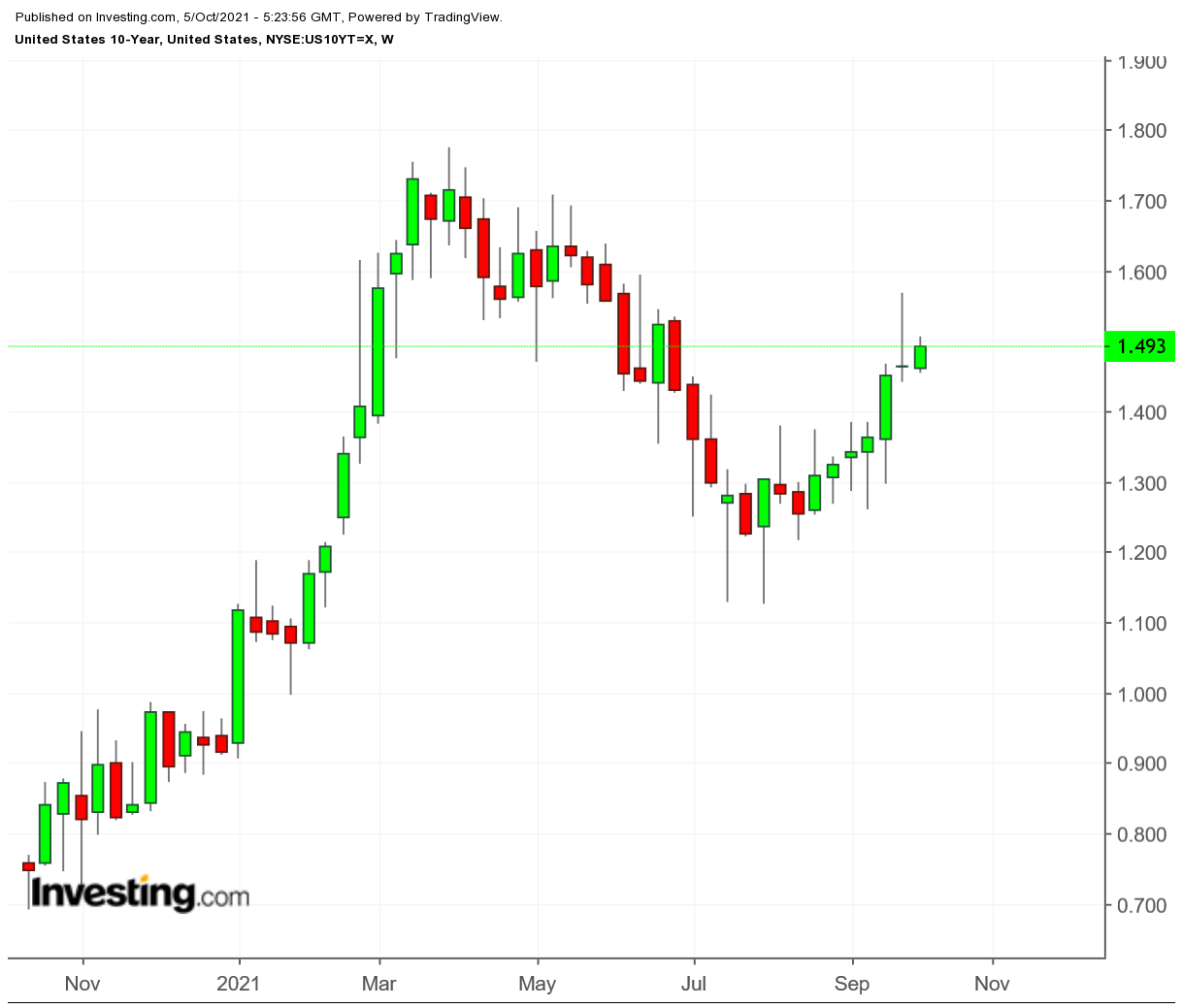Congressional dysfunction is running rampant as investors are growing genuinely worried about inflation. That's keeping U.S. Treasury yields high.

Yield on the benchmark 10-year Treasury hovered just below 1.5% in a flat start to the week after hitting well above that level last week.
But stocks—especially overpriced technology stocks—tanked. Analysts blamed strong Treasury yields, which in turn they said were the result of inflation and the outside chance of a debt default.
House Speaker Nancy Pelosi caved into her strong progressive bloc and reneged on her promise to hold a vote last week on the bipartisan infrastructure bill already passed by the Senate.
Senate Majority Leader Chuck Schumer set a deadline of Oct. 31 to pass the twinned legislation on infrastructure and social policy spending, and Treasury Secretary Janet Yellen grew more strident about the government running out of money by Oct. 18. Analysts say the real drop-dead date could be early November.
Senate Minority Leader Mitch McConnell reiterated his determination to keep Republicans from voting on an increase or suspension of the debt ceiling, insisting that Democrats take responsibility for it since they want to pass the massive spending bills without Republican votes.
What a madhouse. Fortunately, the economy seems strong enough to weather the political turbulence.
Rising US And Eurozone Prices, Debt-Ceiling Jitters, Jobs Data Eyed
The underlying economic problem is inflation. James Bullard, head of the Federal Reserve Bank of St. Louis, said inflation could remain high for some time as his business contacts tell him they have no problem raising prices.
Consumer spending data released on Friday showed a 0.8% increase from the previous month as pandemic savings and pent-up demand unleashed spending and showed why businesses have no trouble raising prices.
Bullard has been agitating for more aggressive Fed action to curb inflation. Even Fed Chairman Jerome Powell, who has long insisted that inflation is transitory, last week acknowledged that it was staying higher and lasting longer than he anticipated.
Bullard worries that people may start to expect higher inflation as the norm—inflation expectations coming un-anchored are policymakers’ worst fear.
The debt ceiling debate is having the biggest impact on short-end Treasury yields, as the one-month Treasury bill yield spiked more than 2 basis points to hit 0.1450%.
Investor attention is also focused on jobs data out later this week. The monthly ADP payroll report is released Wednesday and the Bureau of Labor Statistics nonfarm payroll data prints on Friday. The expectation is that the numbers will be good enough to give the Fed a green light for tapering its $120 billion in monthly bond purchases.
But the inflation worries could counteract any positive signals, as investors will want to push yields higher to keep pace with inflation and the risk of quicker action by the Fed to raise interest rates. Bullard, for instance, wants to see two rate hikes next year already.
In Europe, growth and inflation were also picking up and pressuring central banks to reduce monetary stimulus. Bank of England Governor Andrew Bailey said last week that the central bank’s nine-member Monetary Policy Committee is ready to raise rates if necessary to brake inflation.
Germany’s inflation hit a 29-year high in September, according to data released on Friday, reaching 4.1% as energy shortages fueled price increases. Food prices also showed strong gains. Inflation in France reached an annualized 2.7% for September, a 10-year high for that country.
